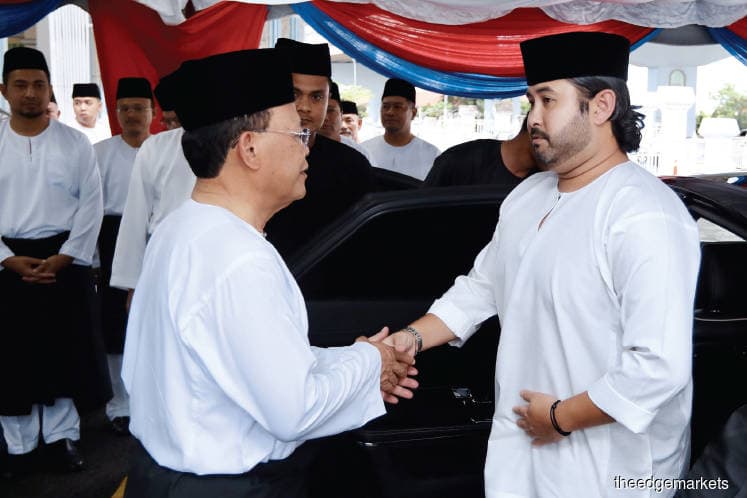
This article first appeared in The Edge Malaysia Weekly on April 15, 2019 - April 21, 2019
BACK in 1978, the then prime minister Tun Hussein Onn appointed Datuk Abdul Rahim Bakar as Pahang menteri besar. But Rahim served for only one term because of a crisis with the Pahang Sultan.
In 2016, there was a standoff in Terengganu when the then MB Datuk Seri Ahmad Razif Abdul Rahman was said to encounter problems with the state’s ruler. He even had his Datuk Seri title revoked. However, a full-blown crisis was averted and in December of that year, the Sultan consented to restore the title to him.
In 2008, when the coalition then known as Pakatan Rakyat triumphed in Perak in the general election, the coalition submitted three names to the Perak palace for the post of MB. Raja Nazrin Shah, who was Regent at the time, chose Datuk Seri Nizar Jamaluddin, who was then with PAS.
Then there was the infamous Kajang move in 2014. The Sultan of Selangor rejected the sole candidate for MB submitted by PKR. That candidate, as we know, was Datuk Seri Wan Azizah Wan Ismail. After an impasse, the Sultan consented to the appointment of Datuk Seri Azmin Ali to helm the state government, replacing the ousted Tan Sri Khalid Ibrahim.
There have been other instances when the rulers have been involved in the appointment of menteris besar, although it is only right that the political party with the most elected representatives in the state assembly picks the MB from among their number.
In the words of Prime Minister Tun Dr Mahathir Mohamad, “if rulers pick the MB, then we are not a democratic country”. He is absolutely right.
Therefore, political parties, whether in Pakatan Harapan or Barisan Nasional, after deciding on their choice for the menteri besar’s post, have always presented the name of their candidate to the palace for the rulers’ consent.
Of late, however, there have been cases where a list of names has been presented to the palace. The impression is that by submitting more than one name, the parties are allowing the ruler to have the final say in deciding who becomes MB.
Constitutional expert Aziz Bari thinks it has become the political culture among parties in Malaysia to submit several names.
Aziz, a DAP leader and exco member in the PH-led Perak state government, thinks “this is a problem among the parties and politicians who somehow engage in rivalry among themselves”.
But then, perhaps several names are submitted because of the possibility that the ruler may reject the majority party’s sole candidate, as has happened in the past.
“In a parliamentary system, the head of state cannot do this. In fact, there is no rule that says more than one name must be put forward by the majority party,” says Aziz.
According to him, “by law, if the majority party submits just one name, the head of state must accept it and he cannot ask for other names to be submitted”.
Now, we are seeing events unfolding in Johor. Some call it a crisis, reminiscent of the 1993 constitutional crisis even.
To Aziz, a crisis it is not, at least not for now. “It is a crisis when the situation is essentially jammed or when the ordinary procedure is unable to deliver [an outcome]. What is happening now has got nothing to do with the 1993 crisis, as it was then about immunity and privileges accorded by the constitution to the rulers or heads of states.”
The present spat, he says, “is about the power to appoint an MB or government”.
But first, let us look at the resignation of the MB, as announced by the prime minister recently.
There had been speculation that the PH government wanted to replace Datuk Osman Sapian as it was said the federal leadership was not happy with his performance in running the state and the blunders over the Sungai Kim Kim pollution incident and territorial waters dispute with Singapore.
But there are sources who say it was the Johor Sultan who wanted Osman removed, and remarks by the crown prince, the Tengku Makhota of Johor or TMJ, supported that.
As speculation swirled, hours before Osman’s resignation was announced, the Tengku Mahkota confirmed the MB was to be replaced but claimed it was not on orders from PH. Instead, the crown prince said his father, the Sultan of Johor, had decreed months earlier that a successor be found for Osman.
“However, somebody is taking credit and mileage claiming that he ordered it,” he said on his official Twitter account on April 9, Malay Mail Online reported.
But a day later, Malay Mail Online quoted a source familiar with the matter as saying that the Johor Sultan had not consented to Osman’s resignation, although three names have surfaced as possible replacements.
As I write this, the Sultan is overseas and it is said he will be back home on Friday (April 12). Osman is on leave from state matters until Saturday (April 13), when it is believed he will have an audience with the Sultan.
Perhaps when you read this article, the situation would have become clearer. But then, it could also get murkier.
The Sultan of Johor has, meanwhile, warned “outsiders” not to interfere in affairs of his state. The PM responded by saying the federal government is authorised to comment on the state’s affairs as Johor is part of the federation.
I must say I agree, what more when the coalition in control of the federal government is also the government in Johor.
Mohsin Abdullah is a contributing editor at The Edge. He has covered politics for more than four decades.
Save by subscribing to us for your print and/or digital copy.
P/S: The Edge is also available on Apple's AppStore and Androids' Google Play.